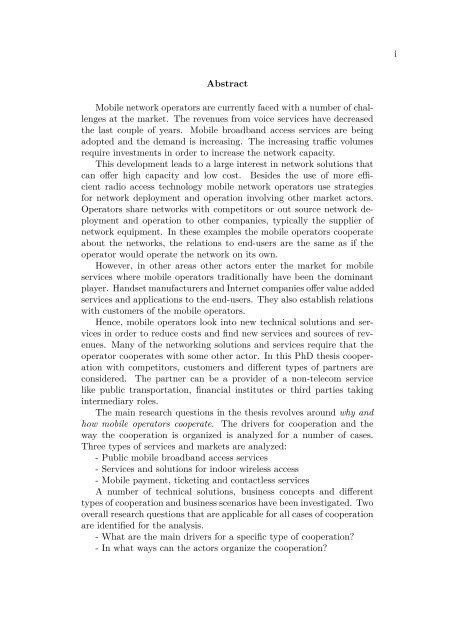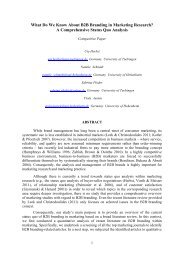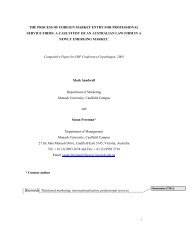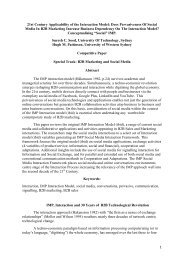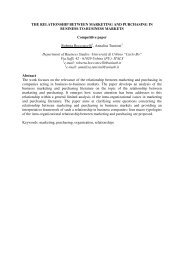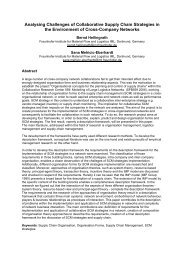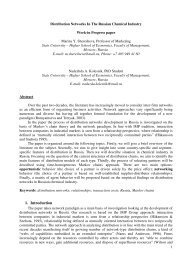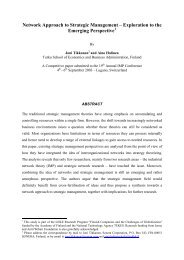Mobile Network Operators and Cooperation - IMP Group
Mobile Network Operators and Cooperation - IMP Group
Mobile Network Operators and Cooperation - IMP Group
Create successful ePaper yourself
Turn your PDF publications into a flip-book with our unique Google optimized e-Paper software.
i<br />
Abstract<br />
<strong>Mobile</strong> network operators are currently faced with a number of challenges<br />
at the market. The revenues from voice services have decreased<br />
the last couple of years. <strong>Mobile</strong> broadb<strong>and</strong> access services are being<br />
adopted <strong>and</strong> the dem<strong>and</strong> is increasing. The increasing traffic volumes<br />
require investments in order to increase the network capacity.<br />
This development leads to a large interest in network solutions that<br />
can offer high capacity <strong>and</strong> low cost. Besides the use of more efficient<br />
radio access technology mobile network operators use strategies<br />
for network deployment <strong>and</strong> operation involving other market actors.<br />
<strong>Operators</strong> share networks with competitors or out source network deployment<br />
<strong>and</strong> operation to other companies, typically the supplier of<br />
network equipment. In these examples the mobile operators cooperate<br />
about the networks, the relations to end-users are the same as if the<br />
operator would operate the network on its own.<br />
However, in other areas other actors enter the market for mobile<br />
services where mobile operators traditionally have been the dominant<br />
player. H<strong>and</strong>set manufacturers <strong>and</strong> Internet companies offer value added<br />
services <strong>and</strong> applications to the end-users. They also establish relations<br />
with customers of the mobile operators.<br />
Hence, mobile operators look into new technical solutions <strong>and</strong> services<br />
in order to reduce costs <strong>and</strong> find new services <strong>and</strong> sources of revenues.<br />
Many of the networking solutions <strong>and</strong> services require that the<br />
operator cooperates with some other actor. In this PhD thesis cooperation<br />
with competitors, customers <strong>and</strong> different types of partners are<br />
considered. The partner can be a provider of a non-telecom service<br />
like public transportation, financial institutes or third parties taking<br />
intermediary roles.<br />
The main research questions in the thesis revolves around why <strong>and</strong><br />
how mobile operators cooperate. The drivers for cooperation <strong>and</strong> the<br />
way the cooperation is organized is analyzed for a number of cases.<br />
Three types of services <strong>and</strong> markets are analyzed:<br />
- Public mobile broadb<strong>and</strong> access services<br />
- Services <strong>and</strong> solutions for indoor wireless access<br />
- <strong>Mobile</strong> payment, ticketing <strong>and</strong> contactless services<br />
A number of technical solutions, business concepts <strong>and</strong> different<br />
types of cooperation <strong>and</strong> business scenarios have been investigated. Two<br />
overall research questions that are applicable for all cases of cooperation<br />
are identified for the analysis.<br />
- What are the main drivers for a specific type of cooperation?<br />
- In what ways can the actors organize the cooperation?


